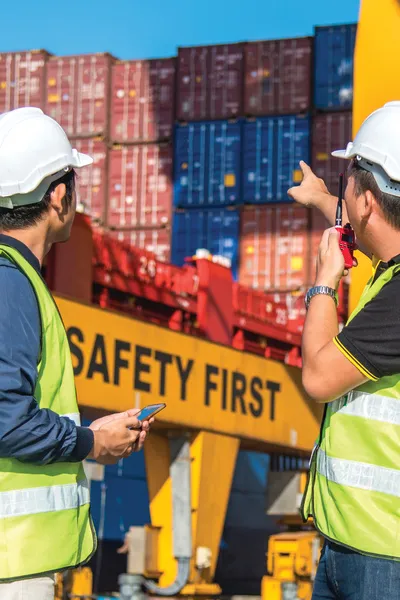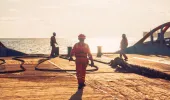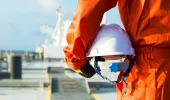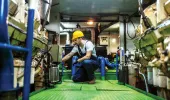As a team, we aim to provide:
- Support to operators wanting to improve in the area of the human element
- Resources to support better safety culture and seafarer wellbeing
- Research and insight that supports industry to do better
- A forum for discussion in the form of the Human Element Advisory Group (HEAG)
What is the Human Element
In the maritime context, the human element is a broad and complex topic that affects all aspects of ship design and operation. It refers to the understanding of interactions between people and the systems they work in, whether it's their physical environments or the wider system, for example processes or training.
Seafaring is a high-risk occupation with distinctive risk factors which differ from those found on shore. A ship is also unique in that it is not only a place of work, within which there are several discrete workspaces, each of which may have different operational criteria, but it is also a ‘home’ to those who work on board. For any ship to operate safely and effectively, it must be designed to support the people who work on it, without detriment to their health, safety and overall performance. To achieve this, the human element brings together anatomy and physiology, psychology, engineering, and statistics to improve system performance and seafarer wellbeing.
The Human Element Team at the Maritime and Coastguard Agency (MCA) works closely with the UK Ship Register and our customers. Together, we focus on improving seafarer safety by examining every part of the system that impacts seafarer safety (for example, the organisation, the job, the environment and individual behaviour). This helps to guide positive changes at every level of the maritime industry.
Human Element Advisory Group (HEAG)
HEAG is an industry-wide group established to undertake and collaborate on projects based on the priorities established by Human Element Strategy Group (HESG). Previous HEAG events have focused on leadership and safety learning through the lens of regulation, the human element in a changing world and the relationship between safety culture and seafarer wellbeing. HEAG provides the maritime industry, particularly those working in seafarer safety and human factors, an opportunity to share ideas and have discussions on improving seafarer safety and wellbeing. This helps inform the Maritime and Coastguard Agency’s human element strategy.
To get involved or join our mailing list to be kept informed of our work and upcoming events, email the team at human.element@mcga.gov.uk
Work of the Human Element Team
At the MCA, we promote the principles of human element to promote the improvement of seafarer safety and health through regulatory and non-regulatory measures.
Find out more about our work below.
Seafarer wellbeing guidance
The team has a range of guidance on fatigue and fitness, common people related factors (“Deadly Dozen”) distraction and leadership.
More information can be found in the following Marine Guidance Notices (MGNs):
Maritime incidents and the human element
The team analyses published Marine Accident Investigation Branch (MAIB) reports from 2010 onwards to draw out the major human element components in maritime accidents. This supports evidence-based policymaking.
Review of the Human Element, Leadership and Management (HELM) training
HELM is a mandatory course for Masters and Officers aimed at building the skills and competencies to manage and lead crew on board. In 2018, the MCA supported a review of the HELM. Following the review, the team are supporting STCW with revision of HELM to improve the limitations identified in the Babcock review.
Suicide and seafarers
Ipsos was commissioned by the Department for Transport (DfT) and the MCA to conduct research into the mental health of seafarers and, specifically, suicide among seafarers. The Suicide and Seafarers Report discusses the mental health of seafarers and the impacts of suicide, the support available and the potential under-reporting of suicides in the sector in 2022. Read the full report on the GOV.UK website.
Wellbeing at Sea Tool
This tool was developed in collaboration with the MCA’s official publisher TSO, software developer Snap Surveys, and industry. It is a digital survey that is completed by seafarers and provides practical advice on how to manage and improve wellbeing at sea. The anonymised data it collects is sent to managers to help them identify priority areas for improvement and highlight best practice. To learn more about how to access this tool, visit the wellbeing at sea tool website https://www.wellbeingseatool.com/
Maritime Safety Climate Tool (SCT)
This tool was developed in collaboration with the Health and Safety Executive (HSE) and maritime companies to develop a maritime-specific tool to enable companies to assess how their employees perceive safety culture. It won the 'Best Use of Health and Safety Data to Lower Incident Rates' category at the Safety and Health Excellence Awards 2023. To learn more about how to access this tool, please visit the Health and Safety Executive website https://books.hse.gov.uk/Safety-Climate-Tool
Human Element in maritime publications
- A Standard for Seafarers' Mental Health Awareness and Wellbeing Training
- Wellbeing at sea: A pocket guide for seafarers
- Wellbeing at sea: A guide for organisations
- Being Human in Safety-Critical Organisations
- Behaving Safely
- Human Element at the International Maritime Organization (IMO)
- IMO Guidelines on Fatigue
- Maritime Safety Climate tool
- Wellbeing at Sea Tool
- Marine Guidance Notices: MGN 505, MGN 520, MGN 638, MGN 351
Contact the team
You can contact our Human Element team by email at human.element@mcga.gov.uk






